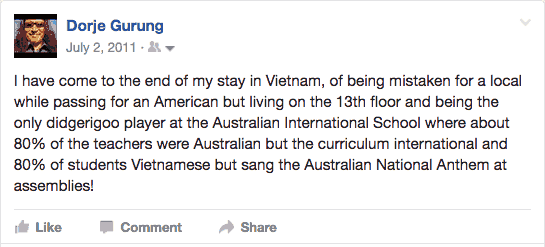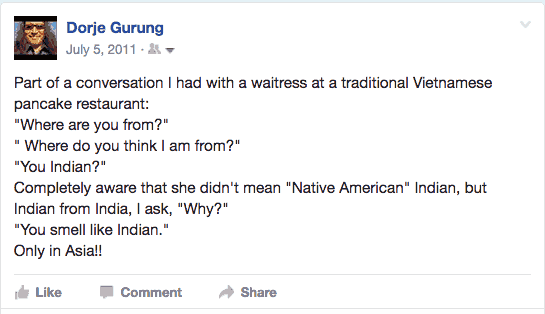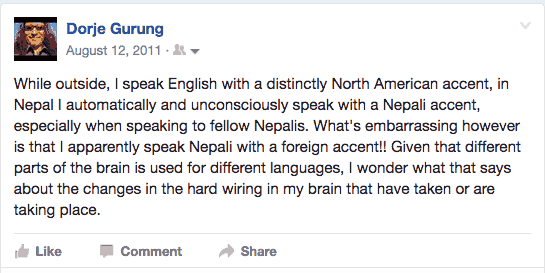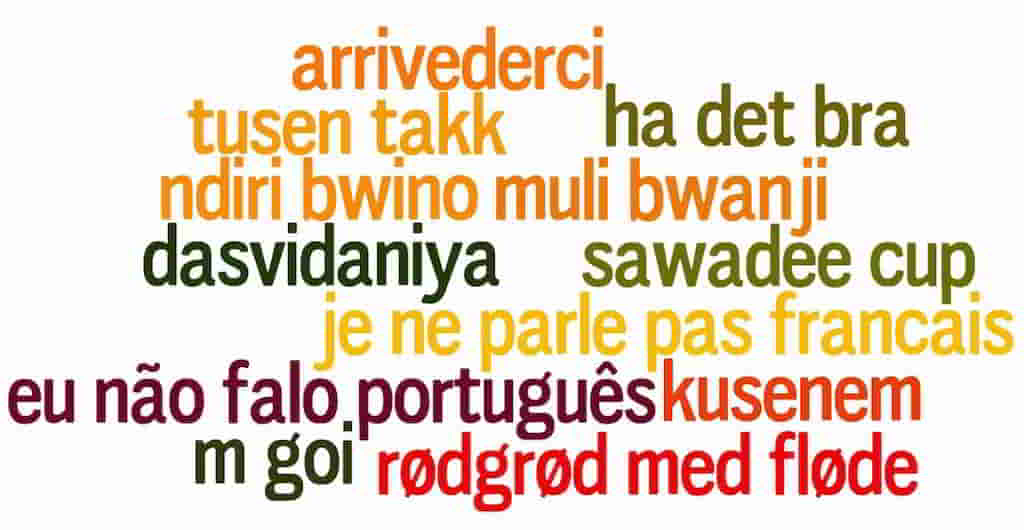I have had numerous very interesting and insightful experiences around the world, as well as in my home country of Nepal, studying, working and traveling. Some of those experiences, interestingly enough, have been because of — and associated with — my versatile tongue!
According to the 2011 Census Report, the population of Nepal speak 123 languages and less than 50% consider Nepali (Khas-kura) — the National language and the mother tongue of hill so-called high caste Hindus — their mother tongue. In other words, majority of Nepalese grow up speaking at least two languages.
I grew up with four languages, which, of course, hadn’t been that big of a deal in the country. Having a versatile tongue was just not prized or commended and therefore hardly even recognized. But, Nepalese people speaking Nepali with an accent different from that of the hill so-called high castes was (and probably still is) considered a sign of “backwardness” and so looked down upon and even made fun of!
I discovered — and really became aware of — my versatile tongue for the first time at the United World College of the Adriatic.
With 200 students representing 65 different countries, I became acquainted with dozens of languages and accents I had hardly ever heard of. As a result, I learned to identify numerous languages and many different accents, and thereby identify the nationality of a person just based in their speech.
(Identifying a language, and therefore nationality, is straight forward. But when I am stuck with an accent, I just rely on my storehouse of accent patterns of friends and others I know. I do a mental “search” for the friend or person with whose accent the new person’s matches and, knowing the nationality of my friend or acquaintance, I am able to guess identity of the unknown accent and the nationality of the new person.)
Plus, I studied — and attempted to — learn the local language: Italian. Naturally, I also learned a word of this language here, a phrase of another language there, I practiced speaking a bit of this language and a bit of that language etc. It was in all those processes that I discovered the versatility of my tongue!
My friends were really impressed by my ability to pronounce words, phrases and expressions in their language perfectly, without any hint of an accent when they would teach them to me. One that has stuck with me is the Danish phrase “rødgrød med fløde” my friend Rikke made me pronounce to test me! (Follow the link to hear how it’s pronounced!)
Once, I even completely fooled an Italian friend, on the phone, with my near-perfect Italian accent!
Some time during my second year at the UWC, I had traveled to Rome for a US college admissions interview. After the interview, I had called my girlfriend back at the UWC.
This was before mobile phones when you called the single landline in the dorm. A random person would receive it who then would go check the dorm room of the person you were calling.
I instantly recognized the person at the other end as an Italian friend of mine. Let’s call her “O.”
I can’t remember why but I decided to speak Italian to her the whole time!
I asked to speak to my girlfriend. Let’s call her “V.”
After going offline for a while, in search of V, O comes back online to say that she can’t find her.
I then asked to speak to my good friend “M,” who happened to also be really good friends with O.
Anyway, this time too, when O comes back online, she tells me she couldn’t find M either.
I thank her and hang up.
Arriving back on campus a day or two later, when I next met O, I ask her if she had received a call from someone wanting to speak to V and M.
She says, “Yes, there was this guy who first asked to speak with V and then M. When I found M, I told her that there was this strange Italian guy who wanted to speak to V first and then her. We discussed for a bit and decided that an Italian who knew them both was just a little too strange and suspicious. We decided I would tell him that M wasn’t there either!”
I say, “I guess you didn’t recognize him but that was me!”
Of course, she was completely taken aback!
Not surprisingly, when I next moved to the US, I acquired a Mid-western (American) accent not long after my arrival at Grinnell College in Iowa.
(Accents aren’t genetic; they are an environmental trait, as we say in Science.) Not surprisingly, the process had been a totally unconscious one. So much so that, I think I only truly learned that I had acquired the accent in the Spring of 1991, within less than a year of being in the country. I made the discovery during my first phone conversation with my ex-girlfriend who was still back in Italy.
On the phone one of the first things she says is, “What happened to you?!”
Perplexed, I ask, “What do you mean?!”
She goes, “You don’t sound like you; you sound like an American!”
Graduating from Grinnell College and working as an international teacher, I would learn more about the versatility of my tongue and discover the benefits of my North American accent.
I started my professional career as a teacher back at the UWC of the Adriatic in Italy. I followed that up with stints at the UWC’s in Hong Kong and Norway. In all three countries, I took language lessons. In Hong Kong and Norway, no different from in Italy, my language instructors were really impressed by my lack of accent when I spoke their respective languages!
In Hong Kong, I also discovered — for the first time — one of the many benefits of my American accent. How the average Cantonese stranger (like a shopkeeper or a fellow passenger in the bus/MTR or a bus driver or a waiter at a restaurant etc.) treated me, for instance, depended on whether they had heard me speak English.
If they hadn’t, they would be really disrespectful and/or show their disdain for me and/or avoid helping or serving me and/or ignore me and/or deliberately try to annoy me and/or even deliberately try to insult me etc. because of the assumption they made about me (poor Asian), based ENTIRELY on my looks.
Once I opened my mouth however, there would be a complete u-turn in their treatment of me because they would then assume I were an American and therefore worthy of their respect. For shopkeepers, that also meant that I was a potential customer with much disposable income!
(In Enter the Dragon City, a blog post about my time in Hong Kong, I describe those and other experience in detail.)
The accent also helped with job opportunities!
Had I not an American accent, I would have probably struggled to get international Science teaching jobs in spite of my undergraduate degree from the US and a teaching degree from Australia.
One of the realities of international teaching scene is the preference — by (international) administrators, international parents/guardians and even local parents/guardians — for native English speakers. Many of the issues parents (as well as students) at Qatar Academy had with my “teaching” was my nationality, as much as they might say it wasn’t.
Of course, at times, I also used it to my advantage! 🙂
For example, in countries like Vietnam I just pretended to be an American, at all times.

But not everyone was clued into it, or bought it, as you can tell from the exchange below.

In Nepal too I have taken advantage of my American accent at times, and it has been a boon…mostly!
I have pretended I were an American to get out of awkward situations by speaking only in English, for example. (You can read about that in the blog post Kathmandu in The Nineties.)
I have used it to get my way in other situations too. Like that time when I called Crowne Plaza Kathmandu-Soltee to speak to a guest. I can’t remember if it was a friend or a friend of a friend etc. who had just checked in at the hotel.
Anyway, I call and, speaking politely in Nepali, ask to speak to so-and-so. “He checked in recently,” I add.
The receptionist, after putting me on hold for a bit, comes back on the line and tells me that there is no one by that name staying at the hotel.
I ask, “Please check again because the information I have says that he is.”
“Nop, no such person here,” comes the reply.
I thank the receptionist, hang up, wait some minutes and call right back. But, this time, I speak English and, lo and behold, the guest is there! The receptionist effortlessly patches me through to his room!
Another time at the Tribhuwan International Airport in Kathmandu, trying to check-in for my flight to Doha, Qatar, I am directed to move aside and wait while they run a check on my passport.
I notice the two migrant laborers who had been in front of me in the queue also standing where I had been directed to. I assume they must have been told the same thing and that they had just complied!
But not having heard any of the conversations between the airline official and them, I didn’t know if that were a procedure just the migrant laborers had to go through or everyone. Until that time, I had never been made to go through it in the past, on my way to Doha.
So I ask politely, in Nepali, what they had to do with my passport and why.
But the guy with our passports, about to leave the counter, tells me, in Nepali, “It’s nothing; just routine check. If you could just wait.”
Continuing to speak Nepali, I repeat my request again, “But can you tell me what it is that you have to do with my passport away from this counter?”
He again pretty much gives me the same line.
So, having had it, I blurt out in English, loudly enough for everyone around to hear: “No, I am NOT going to just wait unless you tell me why. Just tell me what’s going on!”
That did the trick! He didn’t walk away with my passport. They processed my boarding pass and I walked away with my passport!
In Nepal, no different from in India (see tweet below), there is no doubt that there are those who accord foreigners — especially white-skinned westerners — considerably more respect and privileges than fellow Nepalese.
No different in #Nepal. White skin is associated with being wealthy & high caste. https://t.co/hEEFZ7mTpw
— Dorje Gurung (@Dorje_sDooing) April 11, 2017
There is also no doubt that there are those who accord considerably more respect and privileges to a foreign-sounding fellow-Nepalese like me!
If I didn’t have the accent, those very same Nepalese people would very likely not give me the same respect, no different from some of my experiences in Hong Kong. My fellow citizens, I am sure, would have also made assumptions about me based on my facial features. And those features give away my ethnicity, that of being a Bhote, a low caste ethnic-Tibetan, according to the very very hierarchical social system based on the Caste System.
As has already been hinted at, the accent hasn’t ALL been a boon for me in Nepal though.
Some view, or take, my speaking English with an American accent as snobbery on my part, or an attempt to show off, which, however, could be the subject of a different blog post all together!
Having said all that, when in Nepal, not only do I, at times, speak English with characteristic Nepali intonations and inflections, especially when speaking to fellow Nepalese, apparently, I have been told, I also speak Nepali funny! Really!

Having operated (and dreamt) in English pretty exclusively, pretty much my entire adult life, and having learned other languages here and there, in the process, my versatile tongue, I guess, has undergone some changes! The result: a changed Nepali accent…again!
Before I left the country, the accent I spoke Nepali with, hadn’t even been the one I started with! I started with a Bhote accent when I learned to speak the language for the first time after arriving in Pokhara from my village. In time, that accent changed into the one I had before I left for abroad — a cross between Pokhara and Kathmandu accents, I think, having grown up living in Pokhara for some time but going to school in Kathmandu, and later living and studying in Kathmandu.
You gain some, you lose some…I guess! 😀 😀
What do you think?

